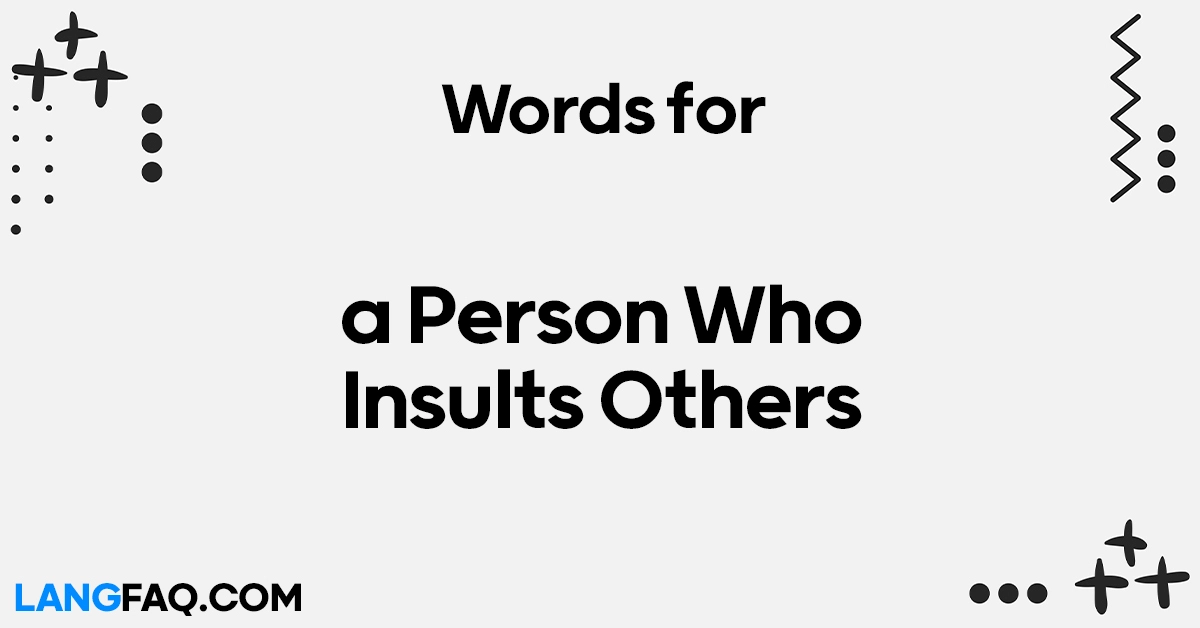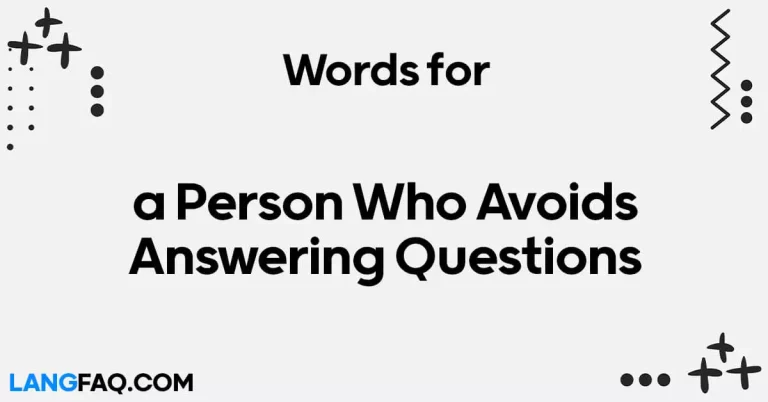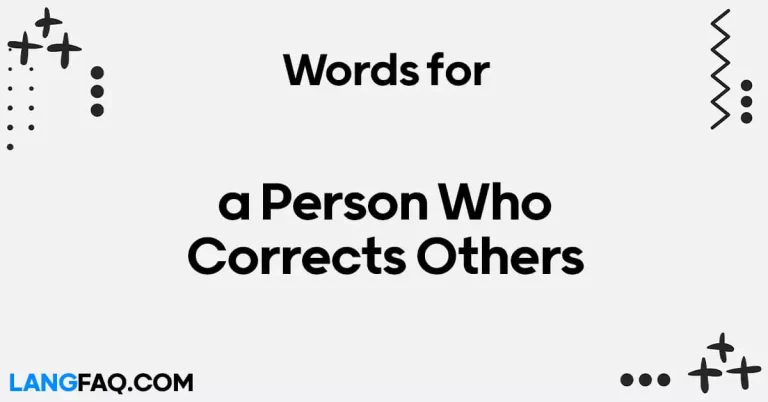Dealing with people who insult others can be challenging. You might have encountered such individuals in your personal or professional life.
But have you ever wondered, “What do you call a person who insults others?”
In this article, we will delve into this topic, providing you with valuable insights and suggestions on how to handle such individuals gracefully.
What Do You Call a Person Who Insults Others?
When it comes to addressing someone who insults others, language provides us with a variety of terms. These terms can help us describe and understand such behavior better.
Let’s explore some of these terms:
Here are 14 alternative ways to refer to a person who insults others:
- Derogatory Speaker: Someone who frequently uses hurtful and disrespectful language towards others.
- Verbal Offender: An individual who habitually commits verbal offenses, including insults.
- Contemptuous Critic: A person who consistently expresses disdain and criticism, often through insulting remarks.
- Provocative Instigator: Someone who deliberately incites conflict and reactions through provocative and insulting language.
- Scornful Taunter: An individual who habitually mocks and belittles others, often resorting to insults.
- Insulting Aggressor: Someone who consistently employs aggressive language, including insults, to assert dominance or control.
- Taunting Antagonist: An individual who taunts and provokes others through hurtful and mocking comments.
- Name-Calling Offender: A person who frequently resorts to derogatory names and insults when addressing others.
- Sarcastic Ridiculer: Someone who habitually uses sarcasm and ridicule, often accompanied by insults.
- Malicious Slanderer: An individual who spreads false and damaging statements about others, frequently including insults.
- Belittling Derider: A person who consistently belittles and disparages others through insulting and offensive remarks.
- Aggressive Harasser: Someone who engages in a pattern of aggressive and hurtful behavior, including verbal insults.
- Hurtful Derogator: An individual who habitually engages in hurtful and derogatory behavior towards others, often using insults.
- Insult Artisan: A skilled individual in crafting offensive remarks, tailored to target an individual’s vulnerabilities.
These terms offer various ways to describe someone who insults others, each emphasizing different aspects of their behavior or demeanor.
Exploring Alternative Terms for Someone Who Insults Others
When it comes to addressing someone who insults others, language offers a rich tapestry of words and phrases that allow us to describe and understand such behavior better.
In this educational blog post, we will delve into alternative terms for individuals who engage in insulting behavior, providing detailed insights on when and where to use them, related rules, exceptions, and valuable tips.
1. Insulting Individual: A Common Description
Definition: An “insulting individual” is someone who frequently engages in offensive and hurtful behavior towards others.
Usage: This is a straightforward and commonly used term. It’s suitable for both casual and formal contexts. You can use it in everyday conversations, workplace discussions, or written communication.
Example: “John has become quite the insulting individual lately, always making snide remarks about his colleagues.”
Tip: When using this term, ensure that the context makes it clear you’re referring to someone who habitually insults others rather than someone who may have made a single offensive comment.
2. Offender: A Formal Descriptor
Definition: A more formal term, an “offender” refers to a person who commits offensive acts, including verbal insults.
Usage: “Offender” is typically used in formal or legal contexts. It’s suitable when discussing more severe instances of insulting behavior, especially when there may be legal implications.
Example: “The company decided to terminate the employment of the offender due to multiple instances of workplace harassment.”
Tip: When using “offender,” be aware that it carries a stronger connotation of wrongdoing and may imply legal consequences.
3. Provocateur: An Agent of Conflict
Definition: A “provocateur” is someone who intentionally provokes or incites conflict, often using insults as a means to achieve this.
Usage: This term is best used when emphasizing the deliberate nature of the behavior. It’s suitable for discussing individuals who actively seek to create discord.
Example: “He’s not just rude; he’s a true provocateur, always trying to stir up trouble with his insulting remarks.”
Tip: Be mindful that “provocateur” implies intent and may not be suitable for describing someone who insults others without conscious provocation.
4. Abuser: A Term of Serious Concern
Definition: An “abuser” typically applies to someone who habitually uses verbal abuse as a way to assert power or control over others.
Usage: This term is serious and should be reserved for situations involving consistent and harmful verbal abuse.
Example: “The counselor helped Sarah realize that she was in an emotionally abusive relationship with an habitual abuser.”
Tip: “Abuser” is a strong term that indicates a pattern of behavior, so use it with caution.
5. Bully: More Than Just Physical Intimidation
Definition: While “bully” is commonly associated with physical intimidation, it can also refer to those who use verbal insults to intimidate or harm others emotionally.
Usage: “Bully” is a widely understood term and can be used in various contexts, including schools, workplaces, and personal relationships.
Example: “Don’t let that coworker bully you with their insulting comments. Stand up for yourself.”
Tip: When using “bully,” it’s essential to emphasize that verbal insults are a form of bullying, not just physical aggression.
6. Taunter: The Art of Mockery
Definition: A “taunter” is someone who mocks or teases others, often resorting to insults to belittle them.
Usage: This term is suitable when describing someone who derives satisfaction from ridiculing others.
Example: “She couldn’t tolerate his constant taunts and insults during the meeting.”
Tip: “Taunter” implies a level of enjoyment in provoking others, so use it when emphasizing the pleasure taken in mocking behavior.
7. Name-Caller: Targeted Insults
Definition: A “name-caller” is an individual who frequently resorts to derogatory names and insults when addressing others.
Usage: Use this term when highlighting someone’s tendency to use specific derogatory terms.
Example: “He’s not just a critic; he’s a relentless name-caller, constantly using hurtful words.”
Tip: Be specific about the derogatory terms used when referring to a “name-caller.”
8. Slanderer: Spreading Falsehoods
Definition: A “slanderer” engages in the act of spreading false and damaging statements about others, which often includes insults.
Usage: This term is appropriate when discussing someone who not only insults but also spreads false information.
Example: “She filed a defamation lawsuit against the slanderer who had been spreading malicious lies and insults.”
Tip: “Slanderer” involves legal implications, so ensure the context supports such a claim.
9. Derogator: Habitual Belittler
Definition: A “derogator” is someone who habitually belittles or disparages others through insults and offensive remarks.
Usage: This term is suitable when addressing consistent, long-term insulting behavior.
Example: “Dealing with a derogator can be emotionally draining, as their insults are a daily occurrence.”
Tip: “Derogator” implies a prolonged pattern of behavior.
10. Harasser: A Pattern of Offensive Behavior
Definition: A “harasser” engages in a pattern of offensive and hurtful behavior, which can include verbal insults.
Usage: Use this term when discussing individuals who systematically engage in insulting and offensive behavior.
Example: “The HR department took swift action against the workplace harasser, who had a history of insulting coworkers.”
Tip: “Harasser” typically involves multiple incidents and may have legal implications.
11. Verbal Aggressor: Expressive Hostility
Definition: A “verbal aggressor” is an individual who consistently employs aggressive language, including insults, to assert dominance or control.
Usage: Use this term when emphasizing the aggressive nature of the insults and their impact on others.
Example: “She’s known as the office’s verbal aggressor, always attacking colleagues with hurtful words.”
Tip: Highlight the aggressive tone and its effects when describing a “verbal aggressor.”
12. Scornful Person: Contemptuous Behavior
Definition: A “scornful person” habitually displays contemptuous behavior, often marked by disdainful insults and mockery.
Usage: This term is suitable when addressing individuals who frequently express contempt through their words.
Example: “Dealing with a scornful person can be challenging, as they rarely miss an opportunity to deliver insulting remarks.”
Tip: “Scornful person” conveys a consistent attitude of contempt.
13. Disparager: Consistent Disparagement
Definition: A “disparager” consistently belittles and diminishes others through insults and derogatory comments.
Usage: Use this term when describing someone who systematically undermines others’ self-esteem.
Example: “He’s not just a critic; he’s a relentless disparager, always finding fault and issuing insults.”
Tip: “Disparager” indicates a pattern of belittling behavior.
14. Insult Aficionado: A Lover of Offense
Definition: An “insult aficionado” takes pleasure in crafting and delivering offensive remarks, often to amuse themselves or others.
Usage: This term is suitable when emphasizing the enjoyment the individual derives from insulting behavior.
Example: “He’s not merely an occasional insulter; he’s a true insult aficionado, always looking for an opportunity to amuse with his words.”
Tip: “Insult aficionado” implies a level of delight in being insulting.
15. Derisive Speaker: Mocking and Ridiculing
Definition: A “derisive speaker” habitually mocks and ridicules others, frequently resorting to insults to achieve this.
Usage: This term is appropriate when discussing someone who consistently uses sarcasm and mockery.
Example: “His derisive speaker persona often alienates those around him due to his constant insults and ridicule.”
Tip: Emphasize the use of sarcasm and mockery when referring to a “derisive speaker.”
16. Verbal Tormentor: Inflicting Emotional Harm
Definition: A “verbal tormentor” specializes in inflicting emotional harm through insults and hurtful words.
Usage: Use this term when describing someone who intentionally causes emotional distress through their words.
Example: “She had to confront her verbal tormentor, who had been subjecting her to relentless insults.”
Tip: “Verbal tormentor” indicates a willful intent to cause emotional pain.
17. Insult Artisan: Crafting Offensive Remarks
Definition: An “insult artisan” excels in crafting offensive remarks, often tailoring insults to target an individual’s vulnerabilities.
Usage: This term is suitable when highlighting the calculated and deliberate nature of the insults.
Example: “He’s not just an insulter; he’s an insult artisan who knows precisely how to hurt with his words.”
Tip: “Insult artisan” suggests a high level of skill in crafting hurtful remarks.
18. Offensive Orator: Proficient in Offense
Definition: An “offensive orator” is proficient in the art of delivering offensive speeches or comments, including insults.
Usage: Use this term when describing someone who can skillfully deliver hurtful remarks.
Example: “The offensive orator managed to silence the room with a particularly cutting insult.”
Tip: “Offensive orator” implies a level of skill in delivering insults.
19. Hostile Speaker: Conveying Hostility
Definition: A “hostile speaker” consistently conveys hostility and aggression through their words, often resorting to insults.
Usage: This term is suitable when emphasizing the aggressive and confrontational nature of the speech.
Example: “The hostile speaker’s insulting remarks created a tense atmosphere during the debate.”
Tip: “Hostile speaker” conveys a consistent attitude of hostility.
20. Verbal Offender: Consistent Offense
Definition: A “verbal offender” repeatedly commits offensive acts through language, including verbal insults.
Usage: This term is appropriate when discussing individuals who engage in offensive behavior consistently.
Example: “The company took action against the verbal offender, as their insults had become a recurring issue.”
Tip: “Verbal offender” implies a pattern of behavior that warrants attention.
21. Mockingbird: The Mimic of Insults
Definition: A “mockingbird” is someone who imitates and repeats insults or hurtful comments made by others.
Usage: This term is appropriate when describing someone who echoes and perpetuates insulting behavior.
Example: “He’s like a mockingbird, repeating the same hurtful insults he hears from others.”
Tip: Use “mockingbird” when emphasizing the imitation of insulting comments.
22. Verbal Provocateur: Inciting Through Words
Definition: A “verbal provocateur” incites conflict and emotional reactions through provocative language and insults.
Usage: This term is suitable when highlighting the role of language in inciting disputes.
Example: “The verbal provocateur thrives on chaos, often using insults to provoke reactions.”
Tip: Emphasize the intent to provoke when using “verbal provocateur.”
23. Insult Impersonator: Mastering the Art of Insults
Definition: An “insult impersonator” is highly skilled at mimicking others’ insulting styles and language.
Usage: Use this term when discussing someone who not only insults but can imitate different insulting personas.
Example: “She’s not just an insulter; she’s an insult impersonator who can mimic anyone’s offensive style.”
Tip: “Insult impersonator” indicates a high degree of mimicry in insulting behavior.
24. Scathing Critic: Expert in Cutting Remarks
Definition: A “scathing critic” excels in delivering harsh and cutting remarks, often bordering on insults.
Usage: This term is appropriate when describing someone who combines criticism with hurtful language.
Example: “His scathing criticism often veers into insulting territory, making it hard to take constructive feedback.”
Tip: Highlight the harshness and hurtful nature of the remarks when using “scathing critic.”
25. Wordsmith of Offense: Crafting Insults with Precision
Definition: A “wordsmith of offense” is exceptionally skilled in crafting precise and hurtful insults.
Usage: This term is suitable when emphasizing the individual’s talent in constructing offensive remarks.
Example: “He’s not just an insulter; he’s a wordsmith of offense who can pinpoint vulnerabilities with his words.”
Tip: “Wordsmith of offense” suggests a high level of skill in crafting hurtful comments.
Exception:
While these terms provide a diverse vocabulary to describe individuals who insult others, it’s important to exercise discretion and sensitivity when using them.
Avoid using these terms to engage in name-calling or retaliation, as this can perpetuate a cycle of negativity. Instead, use them as tools for understanding and addressing insulting behavior with clarity and empathy.
Tips for Addressing Insulting Behavior:
- Stay Calm: When confronted with insulting behavior, maintain your composure to prevent escalation.
- Set Boundaries: Clearly communicate your boundaries and assert that insulting behavior is unacceptable.
- Avoid Retaliation: Refrain from responding with insults, as this only prolongs conflict.
- Seek Support: Reach out to friends, family, or colleagues for advice and emotional support.
- Document Incidents: If insulting behavior continues, document the incidents, which may be necessary for future reference.
- Consider Professional Help: In severe cases, involving authorities or seeking legal assistance may be necessary if insults escalate into harassment or threats.
In conclusion, expanding your vocabulary with these alternative terms can enhance your ability to understand and describe individuals who engage in insulting behavior. Remember to use these terms judiciously, with the goal of fostering understanding and addressing such behavior with empathy and clarity.
Stay tuned for the final section where we’ll provide additional tips and strategies for effectively dealing with insulting individuals and maintaining healthy relationships.
How to Deal with an Insulting Person
Now that you have a better understanding of what to call a person who insults others, it’s essential to know how to handle them effectively. Here are some tips:
1. Stay Calm
When faced with an insulting person, maintaining your composure is crucial. Responding with anger or frustration can escalate the situation.
2. Set Boundaries
Clearly communicate your boundaries and let the person know that their behavior is unacceptable.
3. Avoid Retaliation
Resist the urge to insult them back. This only perpetuates the cycle of negativity.
4. Seek Support
Talk to friends, family, or colleagues about the situation. They can provide valuable advice and emotional support.
5. Document Incidents
If the insults continue and escalate, document the incidents. This may be necessary for future reference.
6. Consider Professional Help
In extreme cases, it may be necessary to involve authorities or seek legal assistance if the insults cross into harassment or threats.
FAQs
Q: Can an insulting person change their behavior? A: Yes, with self-awareness and willingness to change, an insulting person can seek therapy or counseling to address their behavior.
Q: What causes someone to become insulting? A: Various factors, such as past trauma, insecurity, or a need for control, can contribute to someone’s tendency to insult others.
Q: Is it ever appropriate to use insults as a response? A: While it’s generally best to avoid insults, there may be situations where assertively addressing offensive behavior is necessary.
Q: Can ignoring insults be an effective strategy? A: Ignoring insults can be helpful in some cases, as it robs the insulter of the satisfaction of a reaction.
Q: How can I build resilience against insults? A: Building self-esteem and emotional resilience can help you better cope with insults and not take them personally.
Q: Is there a legal recourse for dealing with insulting behavior? A: Depending on the severity and nature of insults, you may have legal options, such as pursuing a restraining order or harassment charges.
Conclusion
Dealing with individuals who insult others can be challenging, but it’s essential to approach the situation with empathy and assertiveness.
By understanding the various terms used to describe such individuals and knowing how to handle them effectively, you can navigate these encounters with grace and confidence.
Remember that setting boundaries and seeking support are essential steps in managing such behavior.







